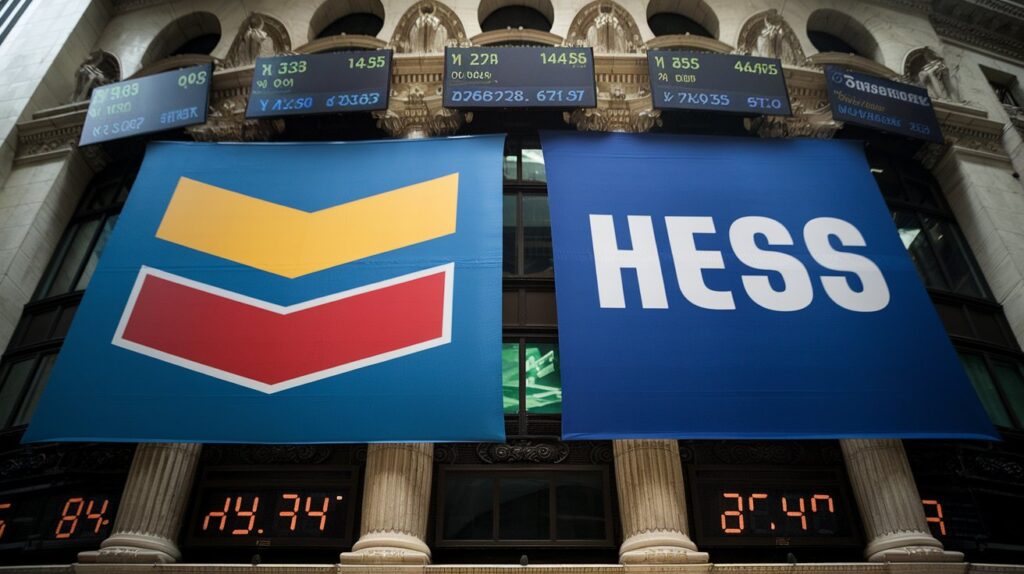Chevron to Acquire Hess Corporation in $53 Billion All-Stock Deal: What It Means for the Energy Industry
Chevron Corporation is set to acquire Hess Corporation in a landmark $53 billion all-stock deal, marking a significant shift in the global energy sector. This acquisition is expected to expand Chevron’s global footprint and enhance its long-term production capabilities, particularly in high-value regions such as Guyana and North Dakota’s Bakken Formation.
Key Details of the Chevron-Hess Deal
The agreement, announced in October 2023, values Hess at approximately $171 per share, with Hess shareholders set to receive 1.025 Chevron shares for each Hess share owned. Including debt, the total value of the deal reaches $60 billion. The acquisition is projected to close in the first half of 2024, subject to regulatory and shareholder approvals.
Chevron’s strategic move is primarily driven by Hess’s lucrative assets, particularly its 30% stake in the Stabroek Block offshore Guyana, one of the most significant oil discoveries of the decade. This block has an estimated reserve of over 11 billion barrels of recoverable oil, positioning Chevron to strengthen its upstream portfolio and sustain long-term free cash flow growth.
Strategic Implications and Market Impact
The acquisition of Hess provides Chevron with several key advantages:
- Expanded Presence in Guyana:
- Guyana’s Stabroek Block has been a hotspot for oil discoveries, and with production ramping up, it offers Chevron a significant production boost.
- This acquisition places Chevron in a favorable position against competitors like ExxonMobil and CNOOC, who also have stakes in the block.
- Enhanced U.S. Shale Assets:
- Hess’s Bakken Formation assets in North Dakota complement Chevron’s existing U.S. shale holdings, bolstering its onshore operations.
- Synergies and Cost Efficiencies:
- The deal is expected to generate significant synergies, reducing operational costs and enhancing shareholder value.
Regulatory Hurdles and Challenges

Despite the strategic benefits, the acquisition has faced regulatory scrutiny. In January 2025, the U.S. Federal Trade Commission (FTC) approved the deal with conditions, including barring Hess CEO John Hess from joining Chevron’s board due to concerns about past communications with OPEC officials.
Additionally, Chevron faces arbitration challenges from ExxonMobil and CNOOC, Hess’s partners in the Guyana joint venture. Both companies are contesting Chevron’s acquisition of Hess’s stake, which could delay the finalization of the deal.
Industry Context and Future Prospects
Chevron’s acquisition of Hess follows a broader trend of consolidation in the energy industry, with major oil companies seeking to secure high-quality reserves amid shifting market dynamics. This deal follows ExxonMobil’s recent $60 billion acquisition of Pioneer Natural Resources, highlighting the industry’s push for greater efficiency and scale.
If Chevron successfully navigates regulatory and legal hurdles, the acquisition will significantly enhance its production capacity and competitiveness in the global energy market.
Conclusion
The Chevron-Hess acquisition marks a transformative moment in the energy sector, positioning Chevron to capitalize on Hess’s high-value assets and drive long-term growth. With a strong foothold in Guyana’s Stabroek Block and expanded U.S. shale operations, Chevron stands to benefit from increased production and operational efficiencies. However, navigating regulatory challenges and arbitration disputes remains crucial to realizing the full potential of this deal.
As the energy landscape evolves, strategic mergers like the Chevron-Hess acquisition underscore the importance of securing future energy supplies and adapting to market shifts. Stay informed and explore how this historic acquisition might impact the global energy industry. Share your thoughts, and don’t forget to subscribe for more updates on key industry trends and insights. [USnewsSphere.com]





